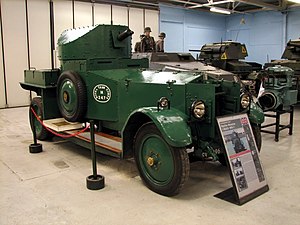Rolls-Royce Armoured Car
| Rolls Royce Armoured Car | |
|---|---|

Rolls Royce 1920 Mk1 Armoured Car at The Tank Museum, Bovington
|
|
| Type | Armoured car |
| Place of origin | United Kingdom |
| Service history | |
| In service | 1915 - 1944 |
| Wars |
First World War Irish Civil War Second World War |
| Production history | |
| Manufacturer | Rolls-Royce |
| No. built | 120 (First World War) |
| Variants | Rolls-Royce 1920 Pattern, Rolls-Royce 1924 Pattern, Fordson Armored Car, Rolls Royce Indian Pattern |
| Specifications | |
| Weight | 4.7 tonnes |
| Length | 4.93 m (194 in) |
| Width | 1.93 m (76 in) |
| Height | 2.54 m (100 in) |
| Crew | 3 |
|
|
|
| Armor | 12 mm (0.47 in) |
|
Main
armament |
.303 Vickers machine gun |
|
Secondary
armament |
none |
| Engine | 6-cylinder petrol, water-cooled 80 hp (60 kW) |
| Power/weight | 19 hp/tonne |
| Suspension | 4x2 wheel (double rear wheels), leaf spring |
|
Operational
range |
240 km or 150 miles |
| Speed | 72 km/h (45 mph) |
The Rolls-Royce Armoured Car was a British armoured car developed in 1914 and used during the First World War, and in the early stages of the Second World War.
The Royal Naval Air Service (RNAS) raised the first British armoured car squadron during the First World War. In September 1914 all available Rolls Royce Silver Ghost chassis were requisitioned to form the basis for the new armoured car. The following month a special committee of the Admiralty Air Department, among whom was Flight Commander T.G. Hetherington, designed the superstructure which consisted of armoured bodywork and a single fully rotating turret holding a regular water cooled Vickers machine gun.
The first three vehicles were delivered on 3 December 1914, although by then the mobile period on the Western Front, where the primitive predecessors of the Rolls-Royce cars had served, had already come to an end. Later in the war they served on several fronts of the Middle Eastern theatre. Chassis production was suspended in 1917 to enable Rolls-Royce to concentrate on aero engines.
The vehicle was modernized in 1920 and in 1924, resulting in the Rolls-Royce 1920 Pattern and Rolls-Royce 1924 Pattern. In 1940, 34 vehicles which served in Egypt with the 11th Hussars regiment had the "old" turret replaced with an open-topped unit carrying a Boys anti-tank rifle, .303-inch Bren machine gun and smoke-grenade launchers.
...
Wikipedia
